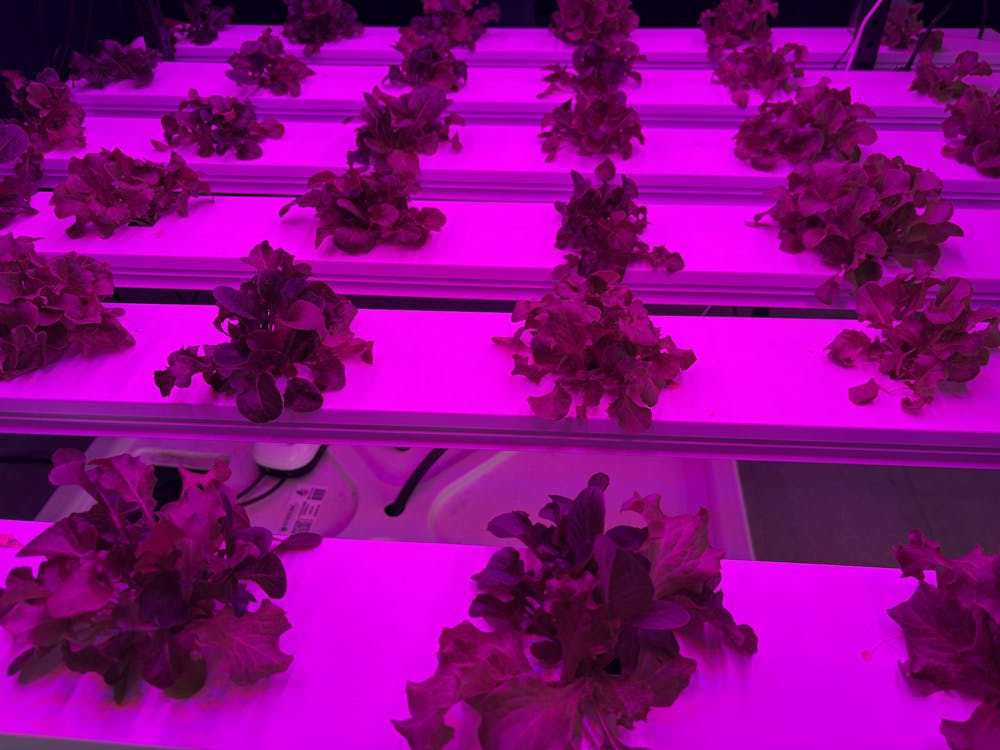Raeanne Raccagno
Copy Editor
Indoor Agriculture Labs held an open house on April 2 to show off the current and potential growth of the partnership between the College’s Schools of Science and Engineering with GeoGreens.
Hydroponics is a virtual growing method where a plant's roots rest in a nutrient-rich water solution instead of soil. According to the iA Labs’ website, it reduces water usage by up to 90% when compared to traditional farming methods, and it minimizes the use of pesticides and fertilizers, giving way for cleaner food production.
GeoGreens is an indoor hydroponic farm in Hamilton, New Jersey, that’s committed to growing fresh produce for the surrounding area year-round. Desmond Hayes founded GeoGreens in 2014 after living and being around different food deserts in New Jersey.
“I noticed that a lot of them weren't getting better,” Hayes said. “I latched on to hydroponics, at the time I was trying to figure out what I wanted to do to have an impact on the world, but also different communities. I found out the hydroponics checks off a lot of boxes environmentally and with helping the community, feeding them more quality produce.”
Hayes has also been donating produce to The Shop at the College.
The unique feature at the College is located in Armstrong Hall 103, which used to be a storage closet. Andrea Welker, dean for the school of engineering, said the space was ideal with its size, access to water and temperature control features.
“The one intent of the lab itself is for it to be very flexible and versatile,” Hayes said.
Multiple designs are underway in the miniature hydroponic farm that experiment with different types and depths of lights. There’s also one aquaponic system, which is a vertical farming system that uses aquatic animals’ waste to fertilize the plants.
An issue that arises with traditional farming has been rain runoff contaminating water from fertilizers and pesticides, but with hydroponics, that’s not a problem. Hayes said the only difficulty that sometimes happens is the changing levels of fluoride that municipalities use to clean water. The differing levels make it harder for him to track the levels and change the water quality accordingly, but it’s never posed a threat to the plant’s health.
Students, staff and the community were invited to the open house to talk to Hayes, learn more about the hydroponic systems and have a taste test of some of the produce. The produce samples were served on edible spoons to prevent any single-use plastic waste.
Right now, students can become involved by volunteering and some classes have been utilizing the space.
“Where I would like for this to go in the future is for us to be doing more sophisticated research over time that's funded by external funding agencies, that we've got students in here working and that it's incorporated into courses across the campus,” Welker said. “I feel like there are a lot of ways that we could utilize this space and provide a good workforce development.”
Hayes said that along with fighting against food deserts, GeoGreens was also developed to work with minority communities and to create different job opportunities for those not familiar with the systems.
“It's endless potential for anybody to get involved in this,” Hayes said. “Yes, it's sufficient, but to introduce more people to it so the business can continue to grow, and whether it be myself or other organizations related to it, populate throughout and we’ll really start to see an impact on food deserts.”







